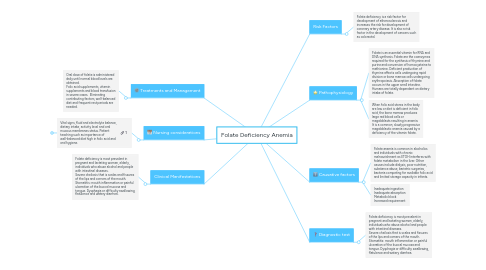Folate Deficiency Anemia
da smon zeray


1. Treatments and Management
1.1. Oral dose of folate is administered daily until normal blood levels are obtained. Folic acid supplements, vitamin supplements and blood transfusion in severe cases. Eliminating contributing factors, well-balanced diet and frequent rest periods are needed.
2. Nursing considerations
2.1. Vital signs, fluid and electrolyte balance, dietary intake, activity level and oral mucous membranes status. Patient teaching such as importance of well-balanced diet high in folic acid and oral hygiene.
2.1.1. Top Priorities
2.1.2. Medium Priorities
2.1.3. Low Priorities

